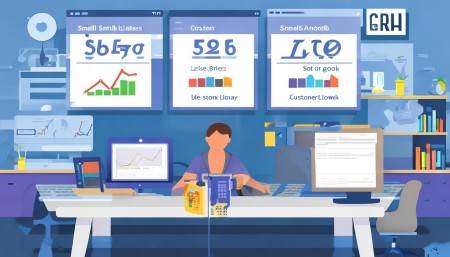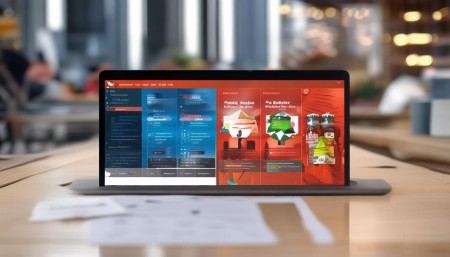
△Click on the top right corner to try Wukong CRM for free
Hey there! So, you've probably heard about CRM systems, right? But have you ever thought about how they can be a total game-changer for the FMCG (Fast-Moving Consumer Goods) industry? Let me tell you, it's pretty amazing. Imagine having all your customer data in one place, making it super easy to understand what your customers want and need. That’s exactly what a CRM system does, and it’s especially useful in the fast-paced world of FMCG.
Now, let’s dive into why this is such a big deal. First off, the FMCG industry is all about speed and efficiency. You’ve got products that are, well, fast-moving, and you need to keep up with the demand. A CRM system helps you do just that by giving you real-time insights into your sales, inventory, and customer preferences. It’s like having a crystal ball that tells you what’s going on in your business at any given moment.
But wait, there’s more! One of the coolest things about a CRM system is that it helps you build stronger relationships with your customers. Think about it: when you know what your customers like, you can offer them exactly what they want. This not only makes them happy but also keeps them coming back for more. And in the FMCG world, where competition is fierce, keeping your customers loyal is key.
Let’s talk about some specific features that make a CRM system so valuable for FMCG companies. For starters, there’s customer segmentation. This means you can group your customers based on their buying habits, preferences, and even demographics. It’s like sorting your friends into different groups based on what they like to do. This way, you can tailor your marketing efforts to each group, making sure you’re hitting the right notes with the right people.

Another great feature is automated marketing. With a CRM system, you can set up campaigns that automatically send out emails, texts, or even social media messages to your customers. It’s like having a personal assistant who reminds you to send birthday cards to your friends. This not only saves you time but also ensures that you’re always in touch with your customers, keeping them engaged and informed.
And then there’s the whole analytics thing. A CRM system can crunch all the numbers and give you detailed reports on everything from sales trends to customer satisfaction. It’s like having a smart friend who can look at all the data and tell you what it means. This information is gold because it helps you make better decisions, whether it’s about which products to stock or how to improve your customer service.
But here’s the kicker: a CRM system isn’t just about managing your existing customers; it’s also about finding new ones. With tools like lead scoring, you can identify potential customers who are most likely to buy from you. It’s like having a radar that spots the people who are interested in what you’re selling. This makes your sales team’s job a lot easier because they can focus on the leads that are most likely to convert.
Now, I know what you might be thinking: “This all sounds great, but what about the cost?” Well, I get it. Investing in a CRM system can seem like a big expense, especially if you’re a small or medium-sized FMCG company. But here’s the thing: the return on investment (ROI) can be huge. When you consider the savings in time, the increase in sales, and the boost in customer loyalty, it’s a no-brainer. Plus, many CRM systems offer flexible pricing plans, so you can find one that fits your budget.

Another concern might be the learning curve. After all, implementing a new system can be a bit daunting. But don’t worry, most CRM providers offer training and support to help you and your team get up to speed. It’s like learning to ride a bike; it might take a little while, but once you get the hang of it, you’ll wonder how you ever managed without it.
So, let’s talk about some real-world examples. Take a company like Unilever, for instance. They use a CRM system to manage their vast customer base and to stay on top of market trends. By doing this, they can quickly respond to changes in consumer behavior and adjust their strategies accordingly. It’s like having a weather app that tells you when a storm is coming, so you can grab an umbrella before you get wet.
Or consider a smaller FMCG company, like a local bakery. They might use a CRM system to track their regular customers’ orders and preferences. This way, they can offer personalized deals and promotions, making their customers feel special and valued. It’s like remembering your best friend’s favorite flavor of ice cream and surprising them with it on a hot day.
But it’s not just about the big and small players; mid-sized FMCG companies can benefit too. For example, a regional beverage company might use a CRM system to manage their distribution network and to track sales across different regions. This helps them optimize their supply chain and ensure that their products are always available where and when customers want them. It’s like having a map that shows you the fastest route to your destination, so you never get lost.
Now, let’s talk about some of the challenges you might face when implementing a CRM system. One of the biggest is getting buy-in from your team. Change can be scary, and some people might resist it. The key is to communicate the benefits clearly and to involve everyone in the process. It’s like convincing your family to try a new recipe; if you explain how delicious it will be and let them help in the kitchen, they’re more likely to be on board.
Another challenge is data quality. A CRM system is only as good as the data you put into it. If your data is messy or incomplete, you won’t get the full benefits. So, it’s important to clean up your data and make sure it’s accurate and up-to-date. It’s like organizing your closet; if everything is in its place, it’s much easier to find what you need.
And then there’s the issue of integration. Many FMCG companies already have other systems in place, like accounting software or inventory management tools. A good CRM system should be able to integrate with these other systems seamlessly. It’s like making sure all the pieces of a puzzle fit together perfectly, so you get a complete picture.

So, what’s the bottom line? A CRM system can be a powerful tool for FMCG companies, helping you to better understand and serve your customers, streamline your operations, and grow your business. It’s like having a superpower that gives you an edge in a competitive market. And who doesn’t want that?
Alright, I hope that gives you a good idea of how a CRM system can be a game-changer for the FMCG industry. But I’m sure you’ve got some questions, so let’s dive into a few of them.
Q: What are the main benefits of using a CRM system in the FMCG industry? A: The main benefits include real-time insights into sales and inventory, better customer relationships, targeted marketing, and improved decision-making through analytics. It’s like having a Swiss Army knife for your business, with tools for every situation.

Q: How can a CRM system help with customer retention in the FMCG industry? A: By providing detailed customer data and allowing for personalized marketing, a CRM system helps you understand and meet your customers’ needs, which keeps them coming back. It’s like being the best friend who always knows what the other person wants.

Q: Is a CRM system suitable for small FMCG businesses? A: Absolutely! Many CRM systems offer flexible pricing and scalable solutions, making them a great fit for small businesses. It’s like having a tool that grows with you, so you can start small and expand as needed.
Q: How long does it typically take to see the benefits of a CRM system in the FMCG industry? A: While it can vary, many businesses start seeing benefits within a few months. The key is to have a clear implementation plan and to train your team effectively. It’s like planting a seed; with the right care, it will grow and bear fruit.
Q: Can a CRM system help with supply chain management in the FMCG industry? A: Yes, it can. By integrating with other systems and providing real-time data, a CRM system can help you optimize your supply chain, ensuring that your products are always in the right place at the right time. It’s like having a GPS for your supply chain, guiding you every step of the way.
I hope that answers some of your questions! If you’ve got more, feel free to ask. Happy CRM-ing!
Related links:
Free trial of CRM
Understand CRM system
AI CRM Systems

△Click on the top right corner to try Wukong CRM for free